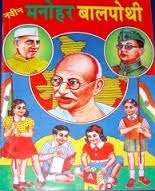Acharya Ramlochan Saran
Acharya Ramlochan Saran (11 February 1889, Muzaffarpur–14 May 1971, Darbhanga) was a Hindi littérateur, grammarian and publisher. He founded Pustak Bhandar, a publishing enterprise, in Laheriasarai in 1915 and moved his publishing office to Patna in 1929. He also founded a number of magazines: Balak Magazine (1926–1986), Himalaya (1946–1948) and Honhar (Hindi and Urdu) (1939).
Acharya Ramlochan Saran | |
|---|---|
 Cover of Saran's work Manohar pothi | |
| Born | 11 February 1889 Sitamarhi Bihar, India |
| Died | 14 May 1971 (aged 82) Darbhanga Bihar, India |
| Occupation | Writer |
| Nationality | Indian |
| Period | 19th–20th century |
Educational work
His Hindi primer Manohar Balapothi attempted to teach the Devanagari alphabet to beginners. He also published Some Eminent Behar Contemporaries by Sachchidananda Sinha,[1] books by Mahatma Gandhi, and other Gandhian literature in both Hindi and English. He published Tolstoy and Gandhi by Dr. Kalidas Nag in English[2] and produced a Maithili language version of the books of Tulsidas. Having edited and published Sidhant Bhasya, a four-volume commentary on Tulsidas's medieval retelling of the Ramayana, the Ramacharitamanasa, he was first to start printing Maithili books in Maithili script (Mithilakshar).
Through his publishing efforts he encouraged many other Hindi and Maithili littérateurs like Ramavriksha Benipuri, Ramdhari Singh 'Dinkar', Acharya Shivpujan Sahay, and Pt. Harimohan Jha. He guided Upendra Maharthi the artist to develop his talents through work under him for over a decade.
Golden jubilee
The golden jubilee celebration was the occasion of Ramlochan's fifty years of successful publishing and literary and cultural contribution, a service to humankind. The celebration brought an appreciation from Mahatma Gandhi, the greatest Indian leader. He sent a message: "Brother Ram Lochan. I appreciate your work. Keep on with such service. Blessing of Bapu."
Achievement
Laheriasarai became a hub of publishing because of Ram Lochan Ji. His company was employing five hundred locals. They were trained by him in editing, production and marketing operations for the best planned effort in South Asia including "Balak" magazine and innumerable valuable creative projects. He was a catalyst to channel the energy released by the nationalist creative talents for freedom in the country, through transformation into literature, informative inspiring books for the masses: 100 essential books for rural libraries: the Almanac, inspiring books on Indian civilization, efforts of think tank for renaissance in India, were mass-produced. Ramlochan was regularly playing host to saints, artists, poets, philosophers, social workers, educationalists, policy planners, and bureaucrats of the region. The Raja and the princes of Darbhanga Raj publicly honoured his contribution in the city and the development of the intelligentsia's creative artists, writer poets, and spirituals.
Death
Ramlochan died in Darbhanga on 11 February 1971. On his death the President of India V. V. Giri mentioned that Acharyaji's service to children's literature will always be remembered as it will always inspire the coming generations. The noted English-language daily Indian Nation wrote in its editorial, "Had Ramlochan Saran not been born in Bihar the progress of Hindi Literature would have been delayed by a decade or two."
References
- Sachchidananda Sinha, Some Eminent Behar Contemporaries, 1944, 218 pages.
- Kalidas Nag, Tolstoy and Gandhi ("In Gandhi's foot-steps" series), 1950, 135 pages